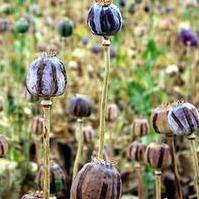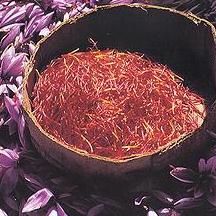 參與國際社會所支持的阿富汗西部赫拉特省番紅花種植計劃的農民說,他們正被塔利班武裝分子相中,要他們改種罌粟。
參與國際社會所支持的阿富汗西部赫拉特省番紅花種植計劃的農民說,他們正被塔利班武裝分子相中,要他們改種罌粟。
在赫拉特省北部的暴徒已經銷毀該地的番紅花花田,上個月襲擊了兩輛載有培育用燈泡的卡車。兩名司機被打死,車輛遭到焚毀。
赫拉特省的保安官員承認,在該省偏遠地方確實有塔利班出現,但也堅持說,政府正在努力防止武裝集團破壞耕作。
赫拉特警察總部發言人尼克薩德(Nur Khan Nikzad)說,武裝分子正積極鼓勵幾個地區的農民種植罌粟,但堅稱,「唯一可能種植鴉片的地區是Shindand和Kushkk。我們的情報顯示,全省鴉片產量下降了90%。」
 塔利班成立於Kushk的平行組織首腦查希爾(Mullah Sayed Zaher)承認該樁卡車攻擊事件。
塔利班成立於Kushk的平行組織首腦查希爾(Mullah Sayed Zaher)承認該樁卡車攻擊事件。
在赫拉特的一位農業事務專家哈利姆(Abdullah Halim)說,他相信塔利班想要藉著指使人們種植罌粟以展示自己的權力,並從利潤豐厚的毒品貿易中獲利。
番紅花植株的雄蕊,主要用於烹調,但也作藥用,不太需要灌溉,抗疾病,可連續收穫好幾年。
 赫拉特地區每年產生 1.5噸,已成為重要的生產地。這看來似乎不是很多,但在阿富汗市場一公斤叫價2000美元,而在出口時增為兩倍。
赫拉特地區每年產生 1.5噸,已成為重要的生產地。這看來似乎不是很多,但在阿富汗市場一公斤叫價2000美元,而在出口時增為兩倍。
「番紅花的種植和交易上有許多障礙,現在又加進另一個重大困難,某些武裝的反對勢力對於番紅花培育計畫的敵視。迄今所有投資都處於危險之中,此次Kushk攻擊事件,意味著丹麥援助小組供應番紅花球莖給鄰近法里亞布省的合約不得不被取消。」主要的交易商賈利勒(Mohammad Jalil)說。
阿富汗的反毒部部長Moqbel說,由於他的工作人員和其他政府機構的努力,以及因造成罌粟枯萎的疾病所賜,去年在赫拉特罌粟的種植面積下降了50%。
不過,他提出警告說,現在由於鴉片有較高的價格和不斷增長的需求,可能鼓勵農民回頭種植罌粟,這現象將扭轉下降的趨勢。
Farmers taking part in an internationally-backed saffron-growing project in Herat province in western Afghanistan say they are being targeted by Taliban militants who want them to cultivate opium poppies instead.
Insurgents in areas north of Herat city have destroyed fields planted with saffron, and last month attacked two trucks carrying bulbs for planting. Both drivers were killed and their vehicles torched.
Security officials in Herat acknowledge that the Taliban presence is significant in remoter parts of the province, but insist they are working to extend the reach of government and prevent armed groups from disrupting farming.
Nur Khan Nikzad, Herat police headquarters spokesman, said the insurgents were actively encouraging farmers in several districts to grow the opium poppy, but insisted, "The only districts where opium is probably still being cultivated are the Shindand and Kushk. Our intelligence indicates that the level of opium production [province-wide] has fallen by 90 percent."
Mullah Sayed Zaher, the head of a parallel administration the Taliban have created in Kushk, admitted responsibility for the attack on the truck.
Abdullah Halim, an expert on agricultural affairs in Herat, believes the Taliban want to display their power by showing they can make people grow poppy, and also to profit from the lucrative drugs trade.
The saffron crocus plant, whose stamens are harvested mostly for culinary use but also for medicinal purposes, needs little irrigation, is resistant to disease and can be harvested over several successive years.
Herat region has become an important producer, generating 1.5 tons a year. That might not seem much, but the stamens fetch US$2,000 a kilogram on the Afghan market, and twice that when exported.
"There have been many obstacles standing in the way of growing and trading in saffron," Mohammad Jalil, a leading trader, said "Another major problem has now been added on - hostility to the plan's cultivation on the part of some in the armed opposition."
All the investment made to date is now at risk, he said, noting that the attack in Kushk meant a contract with a Danish aid group to supply saffron bulbs to neighboring Faryab province had to be cancelled.
Afghanistan's counter-narcotics minister Zarar Ahmad Moqbel says poppy cultivation in Herat fell by 50 percent last year, thanks to the efforts of his staff and other government agencies, and also because of a disease that blighted poppy plants.
However, he warned that higher prices and increasing demand for opium might now be encouraging farmers to turn back to poppy growing, which would reverse the downward trend.
全文及圖片詳見:ENS報導





